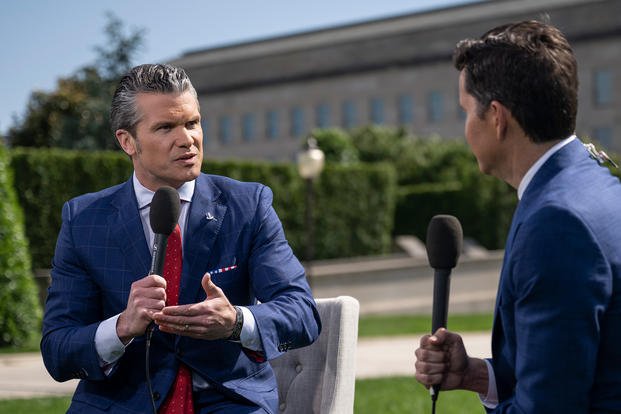Hegseth Starts Evangelical Prayer Services at Pentagon with His Tennessee Church Pastor

In a move that pushes the boundaries of Constitutional prohibition against a state religion, Defense Secretary Pete Hegseth hosted an evangelical prayer service in the middle of the day at the Pentagon in which a pastor praised President Donald Trump as "sovereignly appointed."
A program for the event called it the "Secretary of Defense Christian Prayer and Worship Service." It was held at the Pentagon's auditorium and was broadcast throughout the building on its internal cable network.
While Hegseth made an opening prayer, the majority of the service was run by the defense secretary's personal pastor from a Tennessee church whose leaders have a documented history of advocating for male-led Christian authority over society.
Read Next: Admiral Tapped to Lead Coast Guard as Noem Outlines Plans for Bigger Service[1]
Standing behind a podium bearing the logo of the Defense Department, Hegseth declared that "this is precisely where I need to be, exactly where we need to be as a nation, at this moment in prayer, on bended knee, recognizing the providence of our Lord and Savior, Jesus Christ," according to an audio recording of the event obtained by Military.com.
A video of the service[2] was also posted online by the Defense Department.
Hegseth proceeded to add that the prayer service was voluntary but encouraged those in attendance to "let those you work with know about it."
Meanwhile, the pastor, Brooks Potteiger, prayed for the Pentagon to "become a place where Christians come together to do just this, and we see you move in power, not just through the Pentagon, but through our nation's capital and down throughout this great nation."
Some Defense Department employees said they received an emailed invitation to the event on Wednesday morning, with at least one person remarking that it went to a personal email account.
When asked about the service, Pentagon spokeswoman Kingsley Wilson said that "many different faiths have regular services in the Pentagon Chapel or elsewhere in the Pentagon" and that Hegseth's office "envisions that these prayer and worship services will be a monthly occurrence."
It is not clear whether any of those services that Wilson referred to were advertised via email, broadcast internally, or hosted by the top Pentagon official.
Wilson also stopped short of saying that those forthcoming services would feature other religions, and she noted that any participating civilian clergy are responsible for their own travel expenses.
A defense official said Potteiger paid for his own travel.
Meanwhile, top Hegseth aide Tami Radabaugh posted about the event on social media[3] and described it as the "first monthly Christian Prayer and Worship Service at the DoD."
Defense officials did not answer questions about whether the event ran afoul of the First Amendment of the Constitution, which prohibits the U.S. government from establishing or endorsing one faith above others.
CNN, citing a national security legal expert, reported that the event was a "clear violation" of the Establishment Clause[4] of the First Amendment.
Meanwhile, Trump has a long track record of pushing to blur America's[5] long-standing traditions that[6] separate church and state. Shortly after taking office for his second term, he established a White House Faith Office[7] and signed an executive order banning "anti-Christian bias"[8] and to "end the anti-Christian weaponization of government."
Hegseth's pastor, who came from Tennessee for the service at the Pentagon, runs the Pilgrim Hill Reformed Fellowship -- a member of the Communion of Reformed Evangelical Churches.
The group's governing documents[9] reserve church leadership roles for men and prohibit women from being "mustered for combat."
Hegseth has long been an opponent of women[10] in military combat roles and argued in his last book[11] that the achievements of female service members were inflated or the result of diversity efforts.
"They don't care how many battles we lose as long as our dead are diverse," he wrote, without specifying who "they" were. "We can see this in how the woke PR machine has spun stories of female service members."
Potteiger's sermon featured several references to the Pentagon and military.
"If our Lord is sovereign, even over the sparrows' fallings, you can be assured that he is sovereign over everything else that falls in this world, including Tomahawk and Minuteman missiles, including strategy meetings and war room debriefings. Jesus has the final say over all of it," he said.
The church documents also call being gay, lesbian, bisexual or transgender a "perversion."
"We pray for our leaders who you have sovereignly appointed -- for President Trump, thank you for the way that you have used him to bring stability and moral clarity to our land," Potteiger said in the sermon. "We pray that you would surround him with faithful counselors who fear your name and love your priesthoods."
Ahead of Hegseth's confirmation to lead the Pentagon, USA Today reported[12] that a podcast run by Potteiger and Joshua Haymes, another member of the leadership at Pilgrim Hill, often features the concept of the "sphere sovereignty" in which "Christian men are over three equally powerful spheres -- the government, church and family -- to maintain order and submissiveness through different forms of discipline."
When Hegseth introduced Potteiger on Wednesday, he said that the pastor had "long been a mentor of mine, of my wife and I, of our family" and that he had participated in Bible studies with him "long before anything like this seemed possible."
"And now here we are," he added.
Related: Pentagon Will Use Health Screenings, Commanders to Ferret Out Trans Troops for Separations[13]
© Copyright 2025 Military.com. All rights reserved. This article may not be republished, rebroadcast, rewritten or otherwise distributed without written permission. To reprint or license this article or any content from Military.com, please submit your request here[14].
